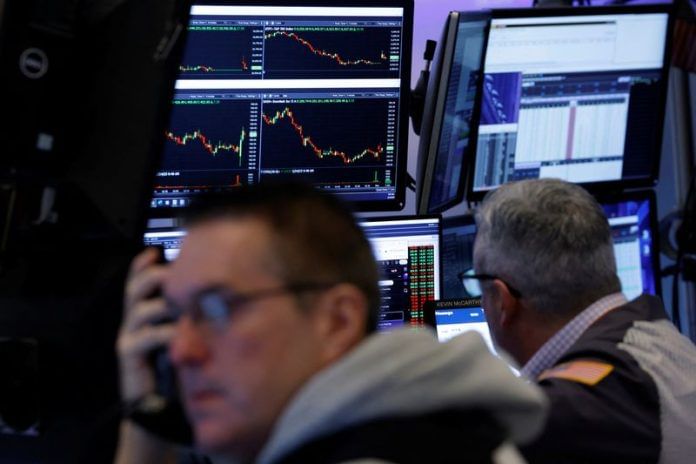By Sinéad Carew and Harry Robertson
NEW YORK/LONDON (Reuters) – Global equities and U.S. Treasury yields both fell on Thursday on worries about global trade tensions and the potential impact on inflation and economic growth after U.S. President Donald Trump threatened duties of 200% on European beverage imports.
Trump said the latest in a long list of tariff threats would be implemented if the EU does not remove U.S. whiskey surcharges. This was after his increased tariffs on all U.S. steel and aluminium imports took effect on Wednesday.
In contrast, Thursday’s Labor Department’s Bureau of Labor Statistics data showed U.S. producer prices (PPI) were unexpectedly unchanged in February and Wednesday’s data showed consumer prices (CPI) rising more slowly than expected.
“If it wasn’t for the trade war going on, the market would be up strongly” on the inflation data, said Tim Ghriskey, senior portfolio strategist at Ingalls & Snyder in New York. “Traders are focused on the trade war.”
“It seems like the (U.S.) administration is being very aggressive and promises at least at this point to be in it for the longer term and the personalities look unlikely to back down at least in the near term,” said Ghriskey.
Bill Adams, Chief Economist for Comerica Bank wrote in a research note that the inflation outlook depends more on government policies such as tariffs, deportations and Department of Government Efficiency (DOGE) moves than “the backward-looking data releases right now.”
On Wall Street, at 02:47 p.m. the Dow Jones Industrial Average fell 399.18 points, or 0.97%, to 40,951.75. The S&P 500 fell 51.21 points, or 0.91%, to 5,548.09 while the Nasdaq Composite fell 231.66 points, or 1.31%, to 17,416.79.
MSCI’s gauge of stocks across the globe fell 6.69 points, or 0.81%, to 824.16.
The pan-European STOXX 600 index earlier closed down 0.15% after rising 0.81% in the previous day’s session.
While the U.S. S&P 500 index is now down almost 6% for the year, European stocks are faring better with support from government spending plans for defence and a potential Ukraine peace deal. Year-to-date the STOXX index is up 6.5% year to date, despite slipping in recent weeks.
U.S. Treasury yields fell on Thursday as tumbling stocks boosted demand for safe haven U.S. government debt with escalating trade wars between the United States and trading partners threatening to dent growth and boost inflation.
The yield on benchmark U.S. 10-year notes fell 3.6 basis points to 4.28%, from 4.316% late on Wednesday.
The 30-year bond yield fell 2.9 basis points to 4.6016% from 4.631% late on Wednesday.
The 2-year note yield, which typically moves in step with interest rate expectations for the Federal Reserve, fell 4.2 basis points to 3.953%, from 3.995% late on Wednesday.
In currencies, the U.S. dollar was a mixed bag, weakening against Japan’s safe haven yen but gaining on the euro and the Canadian dollar.
Against the dollar, the euro was down 0.28% at $1.0855 but against the Japanese yen, the dollar weakened 0.34% to 147.74.
The Canadian dollar weakened 0.39% versus the greenback to C$1.44 per dollar. Sterling weakened 0.06% to $1.2952.
After rallying on Wednesday on a larger-than-expected draw in U.S. gasoline stocks, oil prices slipped on Thursday as traders weighed macroeconomic concerns and demand versus supply expectations.
U.S. crude settled down 1.67%, or $1.13 at $66.55 a barrel and Brent settled at $69.88 per barrel, down 1.51% or $1.07 on the day.
Gold prices raced to a record high within touching distance of the key milestone of $3,000 per ounce on Thursday, with momentum driven by elevated tariff uncertainty and bets on monetary policy easing by the U.S. Federal Reserve.
Spot gold rose 1.71% to $2,981.92 an ounce. U.S. gold futures rose 1.51% to $2,983.50 an ounce.
(Reporting by Sinéad Carew in New York, Pranav Kashyap in Bengaluru, Harry Robertson in London and Kevin Buckland in Tokyo; Editing by Jacqueline Wong, Sam Holmes, Sharon Singleton, Rachna Uppal and Deepa Babington)
Disclaimer: This report is auto generated from the Reuters news service. ThePrint holds no responsibility for its content.






